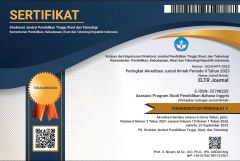EXPLORING AGENCY IN TEACHERS’ IDENTITY CONSTRUCTION THROUGH THE LENS CRITICAL INCIDENT TECHNIQUES
Abstrak terlihat: 276 / PDF terunduh: 192DOI:
https://doi.org/10.37147/eltr.v9i1.229Keywords:
critical incident technique, professional identity, teacher agency, teacher identityAbstract
A major increase in empirical and theoretical interest in teacher identity has occurred within the last 20 years. This increase is frequently ascribed to changing perceptions of teachers' roles. Critical incidents affect teachers' development and their professional identity. The issues include how teachers deal with challenging situations in their profession and their sense of agency. This problem can be overcome by educating students to be more assertive in the classroom. This study aims to investigate the professional identities of three in-service EFL teachers through the lens of critical incidents. Three in-service EFL teachers from different regions in Indonesia were purposefully selected as the participants. The main instrument for data collection in this study was the Critical Incident Technique (CIT) by utilizing reflections and in depth-interview to gather the data and ensure triangulation. Respondents voluntarily participated in this research. The result of this research demonstrated that there were 17 codes of CI which were classified into 3 major categories possessed by the participants, namely: students’ behavior, teachers’ reflective practice, and students’ reaction. The strategies teachers use to handle challenging situations in their profession consist of how teachers deal with decision-making, integrating technology, and developing suitable materials.
Downloads
References
Alberto, J., & Castañeda, F. (2011). Teacher identity construction: Exploring the nature of becoming a primary school language teacher. Newcastle upon Tyne, UK: University of Newcastle upon Tyne.
Anjaniputra, A. G. (2013). Teacher’s strategies in teaching speaking to students at the secondary level. Journal of English and Education, 1(2), 1–8.
Anselma, Y. Y., & Mbato, C. L. (2023). EFL teachers’ transformation: Burnout and resilience experiences in teachers’ professional identity construction through critical incident techniques. Language Circle: Journal of Language and Literature, 18(1), 198-213. https://doi.org/10.15294/lc.v18i1.48259
Beauchamp, C., & Thomas, L. (2009). Understanding teacher identity: An overview of issues in the literature and implications for teacher education. Cambridge Journal of Education, 39(2), 175–189. https://doi.org/10.1080/03057640902902252
Butterfield, L. D., Butterfield, L., Services, P., & Borgen, W. (2005). Fifty years of the critical incident technique. Qualitative Research, 5(4), 475–497. https://doi.org/10.1177/1468794105056924
Byrne, M. (2001). Critical incident technique as a qualitative research method. AORN Journal, 74(4), 536–539. https://doi.org/10.1016/s0001-2092(06)61688-8
Cheng, L. (2021). The implications of EFL/ESL teachers’ emotions in their professional identity development. Frontiers in Psychology, 12. https://doi.org/10.3389/fpsyg.2021.755592
Connelly, F. M., & Clandinin, D. J. (1990). Stories of experience and narrative inquiry. Educational Researcher, 19(5), 2–14. https://doi.org/10.3102/0013189X019005002
Creswell, J. W. (2013). Research design?: Qualitative, quantitative, and mixed methods approaches (4th ed.). London: SAGE Publications.
Creswell, J. W. (2014). Educational research?: Planning, conducting, and evaluating quantitative and qualitative research (4th ed.). Harlow: Pearson.
Durrant, J. (2020). Teacher Agency, Professional Development, and School Improvement. Routledge.
Flanagan, J. C. (1954). The critical incident technique. Psychological Bulletin, 51(4), 327-358. http://dx.doi.org/10.1037/h0061470
Given, L. M. (2008). The Sage encyclopedia of qualitative research methods. Thousand Oaks, CA: Sage Publications.
Hammersley, M. (2012). What is qualitative research? London/New York: Bloomsbury Publishing.
Hong, J., Cross Francis, D., & Schutz, P. A. (2018). Research on teacher identity: Common themes, implications, and future directions. In P. Schutz, J. Hong, & D. C. Francis (Eds.), Research on teacher identity: Mapping challenges and innovations (pp. 243–251). Cham: Springer. https://doi.org/10.1007/978-3-319-93836-3_21
Kayi-Aydar, H., Gao, X. A., Miller, E. R., Varghese, M., & Vitanova, G. (2019). Theorizing and analyzing language teacher agency. Theorizing and Analyzing Language Teacher Agency, 1–276. https://doi.org/10.21832/KAYIAY3910
Korthagen, F. A. J. (2009). Professional learning from within. Studying Teacher Education, 5(2), 195–199. https://doi.org/10.1080/17425960903306955
Kuswandono, P. (2013). The journey of becoming a teacher: Indonesian pre-service teachers reflecting on their professional learning (Doctoral dissertation, Monash University).
Madrid Akpovo, S. (2019). Uncovering cultural assumptions: Using a critical incident technique during an international student-teaching field experience. Contemporary Issues in Early Childhood, 20(2), 146–162. https://doi.org/10.1177/1463949117747108
Patton, M. Q. (1999). Enhancing the quality and credibility of qualitative analysis. Health services research, 34, 1189-1208.
Putri, A. R. D., & Kuswandono, P. (2020). The roles of critical incidents to construct public senior high school English teachers’ identities development. English Review: Journal of English Education, 9(1), 47–60. https://doi.org/10.25134/erjee.v9i1.3778
Schutz, P. A., Nichols, S. L., & Schwenke, S. (2018). Critical events, emotional episodes, and teacher attributions in the development of teacher identities. In P. Schutz, J. Hong, & D. C. Francis (Eds.), Research on teacher identity: Mapping challenges and innovations (pp. 49–60). Cham: Springer International Publishing. https://doi.org/10.1007/978-3-319-93836-3_5
Smit, B. (2002). Atlas.ti for qualitative data analysis. Perspectives in Education, 20(3), 65-76. https://hdl.handle.net/10520/EJC87147
Sudtho, J., & Singhasiri, W. (2017). Exploring pre-service teachers’ professional identity formation through the lens of critical incidents. The Asian EFL Journal Professional Teaching Articles, (99), 38-60.
Tajeddin, Z., & Yazan, B. (2024). Language teacher identity tensions: Nexus of agency, emotion, and investment (1st ed.). London: Routledge. https://doi.org/10.4324/9781003402411
Tripp, D. (1994). Teachers’ lives, critical incidents, and professional practice. International Journal of Qualitative Studies in Education, 7(1), 65–76. https://doi.org/10.1080/0951839940070105
Downloads
Published
How to Cite
Issue
Section
License
Copyright (c) 2025 Ragilia Indaswari, Concilianus Laos Mbato

This work is licensed under a Creative Commons Attribution-ShareAlike 4.0 International License.











 ELTR Journal,
ELTR Journal, 